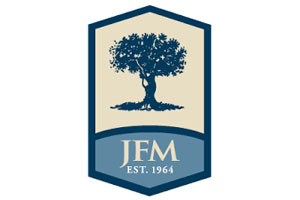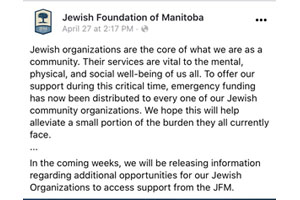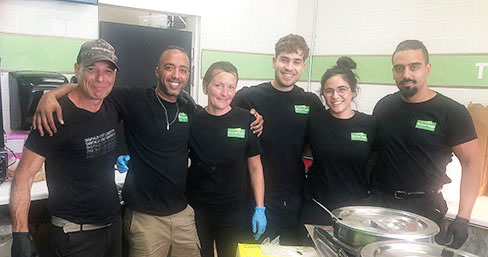Local News
Jewish Foundation releases list of organizations that received emergency funding
 By BERNIE BELLAN
By BERNIE BELLAN
(First posted May 15; amended May 20) Note: This story appeared earlier on this website, but has now been amended to include the list of all “Jewish” organizations that received funding from the Jewish Foundation in what the Foundation says will ultimately be three rounds of emergency funding due to the pandemic.
The Jewish Foundation of Manitoba has given a major boost to many Jewish organizations that have found themselves in dire financial circumstances as a result of the restrictions placed on their operations during the COVID-19 pandemic.
We were first informed that the Foundation was helping many organizations when we were told that cheques had been sent out to many organizations the last week in April. (A copy of the email that was received by many of the organizations informing them of the financial assistance they were about to receive is shown on this page.) We contacted several organizations to verify what we had been told had happened and were able to confirm that cheques had been sent out by the Foundation.
But, while we did attempt to gather more information about what the Foundation was doing, it took some time before we received a detailed description from the Foundation of what exactly was going on. We had emailed a series of questions to various individuals associated with the Foundation on May 3, but it wasn’t until May 7 that we received a detailed response to those questions.

That detail came in the form of an email from John Diamond, CEO of the Jewish Foundation, which was received on May 7.
Following is what John Diamond wrote. His email also includes the exact questions that I posed in my May 3 email:
“I know that Richard Yaffe (Chair of the JFM board) has spoken to you and given you some information about the JFM’s planned approach to assisting our Jewish organizations during the Covid 19 pandemic. Since that time our board has met, as has our grants committee, and I can give you some updated information as well as some background.
“Our overall approach is governed by the legislation that created the Foundation, as well as by the JFM’s mission, vision and values. With this in mind, we saw it as our responsibility to provide at least some level of basic financial support to as many Manitoba based Jewish organizations as possible. We also want to provide further assistance to those organizations that are in particularly dire circumstances as a result of the pandemic.
“On the recommendation of staff, the JFM board decided to defer all regular 2020 grants. In fact, many of those grants related to projects that could no longer take place as a result of the pandemic. We decided to divide the available funds into three equal parts – each about $200,000. The funds for this were re-directed from our 2020 Jewish and Community grants.
“Recognizing that many organizations are very thinly staffed and that some are not as adept as others in applying for funds, the first funding (aggregate $200,000) was distributed, based on organizations’ operating budgets, to provide basic sustaining funding to all of the organizations. In addition, we provided an aggregate of $102,000 to four of Winnipeg’s frontline charities (Winnipeg Harvest, Siloam Mission, Agape Table, and Main Street Project).
“Our grants committee and board are now in the process of finalizing the guidelines for the distribution of the remaining $400,000, which will be done in two parts.
“I have compiled some points that I believe address all of the questions that you posed along with some additional insights into the process.
“1. Were you asked for assistance from certain organizations?”
“Some organizations have approached the Foundation for emergency funding. Many have not.
“2. What was the total amount of money JFM distributed to these organizations?”
“In total, so far we have distributed almost $300,000 in relief funding to Jewish Community organizations and frontline charities (approximately $200,000 to the Jewish organizations from our regular grants, and approximately $100,000 from our community grants fund to the frontline community charities).
“3. What was the formula JFM used to distribute the money?”
“To distribute to our 26 Manitoba based Jewish organizations, five levels of funding were established based on the operating budgets of each organization.
“4. The Foundation froze all spring grants that it was to have allocated. Can you explain why?”
“Many of the projects that the spring grants were to fund were cancelled or significantly altered since the time the applications for funding were submitted. We believe it is our responsibility to take action to help sustain our Jewish organizations, whether or not they have an immediate need and whether or not they have the human and financial resources to apply for funding.
“5. Will the JFM also be distributing more money for the relief of organizations based on need?”
“We know this is not the end of hardships to be endured by our Jewish organizations. Therefore in the next few weeks, more information will be provided to them regarding opportunities to apply for additional relief funding from the remaining $400,000. Our Grants Committee is currently finalizing the process and criteria for organizations to apply.
“To ensure we are implementing processes that will achieve the most impact, the JFM is in constant contact with our Jewish organizations. This includes the Jewish Federation of Winnipeg. As both organizations endeavor to serve the community during this time of need, it will be through our shared information and consistent communication that support is administered where it is needed most.
“Thank you again for helping us communicate our ambition to support our community during this difficult time.”
As a follow-up to this story I contacted the Jewish Foundation with a request that they release the names of the organizations that had received assistance from the Foundation.
On May 14 I sent this email to John Diamond:
“Hi John,
“Would you be willing to release a list of organizations that received the initial grants from the Foundation and the amounts each received?
“(I should note that I’ve had a number of individuals, including one former board member of the Foundation, who’ve asked me whether that information can be given.)”
On May 16 I received the following response from Drew Unger, Marketing & Events Associate with the Foundation:
“In respect to your question, below, I have listed all of the Jewish organizations that have received funding by way of the Phase 1 distribution. We have now added two additional Jewish organizations to the list to bring the total to twenty-eight.
“To address the second part of your inquiry, due to a variety of unique circumstances currently faced by individual organizations, at this point, we will leave the disclosure of the amount they received to their discretion. Soon we will be positioned to paint a clear picture of the impact these distributions are making in the community with the imminent onset of Phase 2.”
1 Adas Yeshurun Herzlia Congregation
2 Aleph Bet Child Life Enrichment Program Inc.
3 Asper Jewish Community Campus of Winnipeg
4 B’nai Brith Canada – Midwest Region
5 B’nai Brith Jewish Community Camp
6 Camp Massad Manitoba
7 Canadian Institute for the Study of Antisemitism
8 Chabad-Lubavitch of Winnipeg
9 Chai Folk Arts Council Inc.
10 Chavurat Tefilah
11 Chesed Shel Emes
12 Chevra Mishnayes Synagogue
13 Congregation Etz Chayim
14 Congregation Shaarey Zedek
15 Gray Academy of Jewish Education
16 Gwen Secter Creative Living Centre
17 Hebrew Congregation of Winnipeg Beach
18 House of Ashkenazie
19 Jewish Child and Family Service
20 Jewish Federation of Winnipeg
21 Jewish Heritage Centre of Western Canada
22 National Council of Jewish Women of Canada-Winnipeg Section
23 Rady Jewish Community Centre
24 Saul & Claribel Simkin Centre
25 Shalom Residences Inc.
26 Talmud Torah Beth Jacob Synagogue
27 Temple Shalom Manitoba Inc.
28 Winnipeg Jewish Theatre Inc.
Local News
Winnipeg Beach Synagogue about to celebrate 75th anniversary

By BERNIE BELLAN (July 13) In 1950 a group of cottage owners at Winnipeg Beach took it upon themselves to relocate a one-room schoolhouse that was in the Beausejour area to Winnipeg Beach where it became the beach synagogue at the corner of Hazel and Grove.
There it stayed until 1998 when it was moved to its current location at Camp Massad.
On August 2nd members of the synagogue will be holding a 75th anniversary celebration.

As part of the celebration anyone who is a descendant or relative of any of the original members of the first executive committee (as seen in the photo here) is invited to attend the synagogue that morning.
If you are a relative please contact Abe Borzykowski at wpgbeachshule@shaw.ca or aborzykowski@shaw.ca to let Abe know you might be attending or for more information about the 75th anniversary celebration.
We will soon be publishing a story about the history of the beach synagogue, which is something I’ve been writing about for over 25 years.
Local News
Vickar Family cuts ribbon on new Tova Vickar and Family Childcare Centre

By MYRON LOVE In the words of Larry Vickar, the Shaarey Zedek’s successful Dor V’ Dor Campaign “is not only a renewal of the synagogue but truly a renewal movement of Jewish life in our community.”An integral part of that renewal movement was the creation of a daycare centre within the expanded synagogue. On Monday, June 23, Larry and Tova Vickar cut the ribbon, thereby officially opening the Tova Vickar and Family Childcare Centre in the presence of 100 of their family members, friends and other supporters of the project.
The short program preceding the morning ribbon-cutting began with a continental breakfast followed by a welcome by both Fanny Levy, Shaarey Zedek’s Board President, and Executive Director Dr. Rena Secter Elbaze. In Elbaze’s remarks, she noted that Larry and Tova wanted their family (including son Stephen and family, who flew in from Florida) and friends at the event to celebrate the opening of the Tova Vickar and Family Childcare Centre, “not because of the accolades, but because, as Larry put it, he hopes that their investment in the congregation will inspire others to do the same.”
“When Larry and I spoke about what this gift meant to him and the message he wanted people to take away,” she continued, “I couldn’t help but connect it to the teachings of Reb Zalman Schachter-Shalomi whose book – Age-ing to Sage-ing – changes the whole way we look at the concept of ageing and basing it on our ancestral teachings.”
She explained that his concept of “Sage-ing” is based on three key ideas – Discover your meaning and purpose; accept our mortality and think about the legacy you want to leave.
“Larry spoke about these exact concepts when we met,” she said.
Elbaze also noted the presence of Shaarey Zedek’s newly-arrived senior Rabbi Carnie Rose, former Rabbi Alan Green, and area MLAs Mike Moroz and Carla Compton.
Larry Vickar expressed his great appreciation for all those in attendance. “Tova and I are deeply moved to stand here with you today for this important milestone in our community”, he said. “We are grateful to be surrounded by all of you, the people we care about, our family and friends… you who have touched our lives and played some part in our journey.”
Local News
New Israeli restaurant opens in River Heights

By BERNIE BELLAN (July 6, 2025) It’s been a long time since our community has been able to welcome the opening of a restaurant that specializes in Israeli food.
That void is now filled with the opening of The Green Falafel, at 1833 Grant (corner of Centennial – next to the Subway), which opened its doors (to huge crowds) on Monday, July 7.

(owners Ariel & Elena Maudi second and third from left)
The restaurant is the fulfillment of a dream long held by the husband and wife team of Ariel and Eden Maudi, who have been living in Winnipeg the past 11 years.
Ariel, who was born in Israel and grew up in Beer Sheva, says that he worked in telecommunications in Ramat Gan for several years. He adds though that he had always dreamed of owning his own falafel stand in Israel, but life was difficult there and he decided to come to Canada as a tourist to see whether there were any opportunities here for him, Eden and their two young children.
Eden, who was born in Russia and moved to Israel with her family in 1996, stayed behind with the two kids, who were both pre-schoolers, while Ariel tested the waters in Canada first.
Ariel says he came to Canada as a tourist in 2013. His first stop was in Toronto, where he acquired his 1st class driver’s license. At the end of 2013 he moved to Winnipeg where he began working as a truck driver. Soon he found himself employed as a successful sales person at Vickar Nissan where, he says, he once achieved the status as the top car sales person in Canada. After working at Vickar Nissan for a number of years, Ariel began working as an installer for Bell MTS.
Meanwhile, Eden began working at a Walmart, later at the Costco on Regent.

But, when the opportunity to move into a space that had been previously occupied by another restaurant, but which had closed, became available, Ariel and Eden decided to open their own Israeli restaurant in an area that hadn’t seen Israeli food served since the controversial closure of Bermax Café in 2019.
The Maudis say that they will be serving a variety of Israeli dishes – all vegetarian, and that they will be fully kosher.
The “green” in Green Falafel, by the way, Ariel Maudi explains, comes from the cilantro and parsley that are added to the chickpeas. In addition, their pitas will be coming from Israel and will be baked fresh daily.
The Green Falafel is open from 10-8 Sunday – Thursday and 10-4 on Friday. (Closed Saturday).Delivery will be available through Uber Eats and DoorDash.
Call 204-557-7837 for information.
